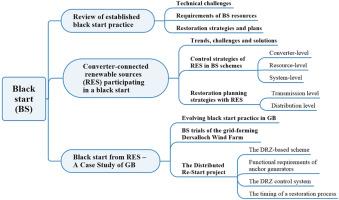可再生能源的黑色起点:英国的回顾与案例研究
IF 16.3
1区 工程技术
Q1 ENERGY & FUELS
引用次数: 0
摘要
黑启动是指电力系统在全部或部分停机后的恢复。这种程度的供电损失是最不寻常的事件,但由于会造成重大的社会和经济后果,因此必须加以防范。许多国家正在向低碳电力系统发展,目前提供黑启动能力的化石发电机正在被可再生能源发电机所取代,其中许多发电机的单机容量有限。大型传统发电机数量的减少导致人们需要重新考虑黑启动的做法,并质疑是否应通过建立多个电力岛(每个电力岛都有较小的发电机组)来取代通过骨架输电系统恢复断电网络的做法。本研究利用学术研究和最近在英国(GB)完成的两个创新项目的成果,回顾了既定的电力系统黑启动实践以及可再生能源参与黑启动的情况。在回顾了传统的黑启动实践后,研究了使用可再生能源和分布式能源资源支持黑启动所面临的挑战和解决方案。讨论了学术研究中的恢复控制和规划策略。然后讨论了国标中不断演变的电力系统黑启动实践,并回顾了国标中两个创新黑启动项目的方法和结果。本文章由计算机程序翻译,如有差异,请以英文原文为准。

Black start from renewable energy resources: Review and a case study of Great Britain
Black start is the restoration of an electrical power system following a total or partial system shutdown. A loss of supply of this magnitude is a most unusual event but must be anticipated as it has significant societal and economic consequences. Many countries are moving towards a low-carbon electricity system, and the fossil generators that currently provide black start capability are being replaced by renewable energy generators, many of which are individually of limited capacity. This reduction in the number of large conventional generators is leading to a need to reconsider black start practices and to question whether restoration of a de-energized network through a skeleton transmission system should be replaced by establishing multiple power islands each with smaller generating units. Using academic studies and the results of two innovation projects recently completed in Great Britain (GB), this study reviews the established power system black start practices and the participation of renewable energy resources in the black start. After traditional black start practices are reviewed, the challenges and solutions for using renewable energy sources and distributed energy resources to support black start are investigated. Restoration control and planning strategies in academic studies are discussed. Then the evolving power system black start practices in GB are discussed, and the methodologies and findings of two innovative black start projects in GB are reviewed.
求助全文
通过发布文献求助,成功后即可免费获取论文全文。
去求助
来源期刊

Renewable and Sustainable Energy Reviews
工程技术-能源与燃料
CiteScore
31.20
自引率
5.70%
发文量
1055
审稿时长
62 days
期刊介绍:
The mission of Renewable and Sustainable Energy Reviews is to disseminate the most compelling and pertinent critical insights in renewable and sustainable energy, fostering collaboration among the research community, private sector, and policy and decision makers. The journal aims to exchange challenges, solutions, innovative concepts, and technologies, contributing to sustainable development, the transition to a low-carbon future, and the attainment of emissions targets outlined by the United Nations Framework Convention on Climate Change.
Renewable and Sustainable Energy Reviews publishes a diverse range of content, including review papers, original research, case studies, and analyses of new technologies, all featuring a substantial review component such as critique, comparison, or analysis. Introducing a distinctive paper type, Expert Insights, the journal presents commissioned mini-reviews authored by field leaders, addressing topics of significant interest. Case studies undergo consideration only if they showcase the work's applicability to other regions or contribute valuable insights to the broader field of renewable and sustainable energy. Notably, a bibliographic or literature review lacking critical analysis is deemed unsuitable for publication.
 求助内容:
求助内容: 应助结果提醒方式:
应助结果提醒方式:


